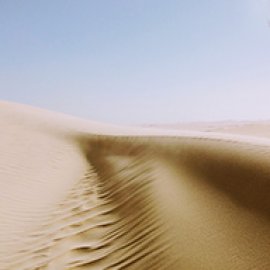Desert Reflections
-
English
-
ListenPause
[intro music] Welcome to World Ocean Radio… I’m Peter Neill, Director of the World Ocean Observatory. What is the antithesis of the ocean? The desert it would seem. I recently traveled to Egypt, purported to be the driest, least rainy, country in the world. Rain averages .1 inches a year; snow rarely falls in the mountains of the Sinai. The country is a sliver of water, edged in green, from a delta on the Mediterranean south into the heart of Africa, the Nile, the longest river in the world, from its source in Burundi, flowing north to Alexandria where it joins an inland sea. The edges are thin and fragile, vulnerable to flood prior to the construction of the great dam at Aswan that controls the water even as it caused great, historic monuments to be moved to higher ground. All the habitation and agriculture of the modern nation is clustered there. The monuments, some dating back to 5000 BC, and the ensuing tombs of the Pharaohs, indicate that not much has changed. The pyramids at Giza rise up out of the sand, uncanny geometric sandstone forms, seemingly impervious to time. The Great Sphynx, constructed around 2000 BC, stares into the sun and wind, a man’s head, no wings, with an eroded perplection as if wondering, Why me? Why here of all places? The cultural artifacts do not disappoint. The burial treasures are mostly removed to museums in Cairo, but the tombs are an astonishing compendium of knowledge, amassed and recorded by a caste of scribes, who carved into the walls in complicated relief documents all aspects of daily life – the rituals and beliefs, the science and medicine, the forms of harvest and sustenance, the great ceremonies that characterized the pharaonic periods. The realization that such a level of civilization existed so long ago is profound; the divisions of rich and poor, the challenges of living in a harsh climate, the rise and fall of autocrats, sent shivers of recognition to this 21st century tourist. How is it different? Inequities. Tyranny. Vast engineering achievement. Science opening the world to unimagined possibilities. Transitory nature of life. Desert reflection. Around all this is a turning of endless sand and horizon. If it was blue, it would be the ocean. There are waves and crests of sand. There are patterns on the surface, made by the wind, sandy spindrift lifted and blown. For infinite water there is infinite rock and gravel and mineral grit that circulates in patterns that cannot easily be anticipated or passed over as they are so ephemeral that they offer nothing to hold onto, no marks by which to guide one’s way. Lost in the desert, lost at sea? Lost. It is impossible not to connect these views with climate; that desertification is one terrible consequence of increasing drought, declining river volumes, and the loss of once fertile ground. What would happen to Egypt if the present trends of heat and storm and climate consequence remain unchecked and carry on with a relentless transformation to dry, dead ground in which nothing can grow. The desert is a dead zone. There is biodiversity there, numerous examples of algae, birds and animals, many insects, grasses and plants, and a remarkable range of over 2200 hundred species fungi and lichens. The Pharaohs’ physicians knew about such things. They discovered ways to live in such a climate, to thrive and survive, to build monuments, make glorious art and artifact, and feed and heal themselves whether pharaohs, citizens, priests, or slaves. Historical research suggests that in 2500 BC, the population of Egypt was 1.6 million; today, census figures indicate over 100 million, still clustered along the Nile, in a land that is 96% desert and rapidly losing habitable land to global warming, urbanization, lost wetlands, saltwater intrusion, and more desert… evermore. Look around. The facts are the same; statistics are similar, the threats are universal. Standing there, comes to mind the famous Shelly verse from his great poem, Ozymandias, a reflection that pertains, and cannot be denied: My name is Ozymandias, king of kings: Look on my works, ye Mighty, and despair!' Nothing beside remains. Round the decay Of that colossal wreck, boundless and bare The lone and level sands stretch far away." We will discuss these issues, and more, in future editions of World Ocean Radio. [outro music]
This week on World Ocean Radio host Peter Neill reflects on a recent trip to Egypt, a dry desert land in the heart of Africa, the civilizations of which are clustered along the Nile, the longest river in the world. The desertification on display there offers clues to universal threats and our climate future: freshwater disruption, loss of land and wetland, urbanization, saltwater intrusion, and rising temperatures.
About World Ocean Radio
5-minute weekly insights dive into ocean science, advocacy and education hosted by Peter Neill, lifelong ocean advocate and maritime expert. Episodes offer perspectives on global ocean issues and viable solutions, and celebrate exemplary projects. Available for syndicated use at no cost by college and community radio stations worldwide.
Image
Photo by Youhana Nassif on Unsplash
@youhananassif
- Login to post comments



